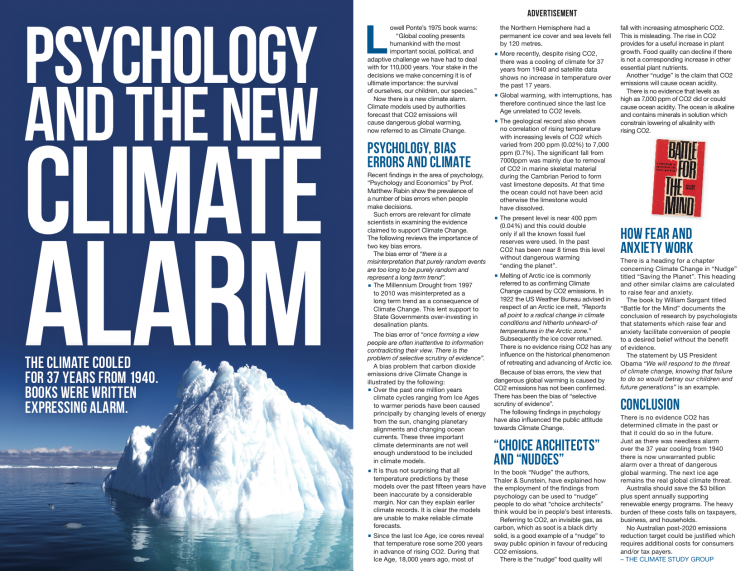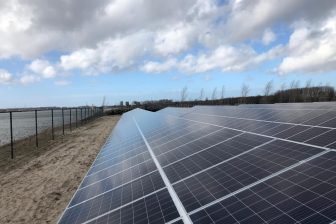Australische psychologen boos over ‘onzinadvertentie’ klimaatsceptici
18 augustus 2015 – De Australian Psychological Society (APS) is boos over een ‘misleidende’ advertentie over psychologie en klimaatverandering. DeSmog linkte de schrijvers aan oa de mijnbouwindustrie.
In de Australische krant The Australian verscheen op 7 augustus een advertentie met de titel ‘Psychology and the new climate alarm’. De schrijvers, ‘The Climate Study Group’, gebruiken argumenten uit de psychologische wetenschap om aan te tonen dat klimaatverandering een aanname is, gebaseerd op twee denkfouten. Volgens de opstellers van de advertentie is de eerste denkfout van degenen die geloven in klimaatverandering de volgende: willekeurige waarden worden aangezien voor een langdurige trend (de droogte tussen 1997 en 2010 die wordt gezien als bewijs voor klimaatverandering). De tweede denkfout: dat mensen niet openstaan voor feiten die niet in hun eigen ‘waarheid’ passen (de bewijzen tegen de stelling dat CO2-uitstoot zorgt voor opwarming van de aarde worden niet gezien). Het echte wereldwijde gevaar is de volgende ijstijd, stelt de groep.
De Australische vereniging voor psychologen (APS) was verbolgen en schreef een brief aan The Australian. Hun punt: de opstellers van de advertentie misbruikten de psychologie om hun onwaarheden over klimaatverandering geloofwaardiger te maken.
DeSmog, ‘een blog over verkeerde informatie over klimaatverandering’, zocht uit wie er precies achter ‘The Climate Study Group’ zitten, de schrijvers van de advertentie.
Uit het bericht van DeSmog
‘(…) DeSmog has found the group members have links to mining, finance, agriculture and free market “think tank” the Institute of Public Affairs (IPA). (…)
None of the members of the group appear to have relevant qualifications in climate science or psychology but do have backgrounds in mining, agriculture and the finance industry. (…)’

Uit de advertentie in The Australian
‘(…) Recent findings in the area of psychology, “Psychology and Economics” by Prof. Matthew Rabin show the prevalence of a number of bias errors when people make decisions. Such errors are relevant for climate scientists in examining the evidence claimed to support Climate Change. The following reviews the importance of two key bias errors.
The bias error of “there is a misinterpretation that purely random events are too long to be purely random and represent a long term trend”. (…)
The bias error of “once forming a view people are often inattentive to information contradicting their view. There is the problem of selective scrutiny of evidence”. (…)
Conclusion
There is no evidence CO2 has determined climate in the past or that it could do so in the future. Just as there was needless alarm over the 37 year cooling from 1940 there is now unwarranted public alarm over a threat of dangerous global warming. The next ice age remains the real global climate threat. Australia should save the $3 billion plus spent annually supporting renewable energy programs. The heavy burden of these costs falls on taxpayers, business, and households. No Australian post-2020 emissions reduction target could be justified which requires additional costs for consumers and/or tax payers. (…)’
Uit de brief van de APS
‘(…) The Australian Psychological Society wishes to register its strong objection to the ‘advertisement’ posted by the Climate Study Group in The Australian (7 August). The advertisement, ‘Psychology and the New Climate Storm’ misuses psychology-based arguments to add credibility to myths and misinformation about climate change. In doing so, the authors illustrate aptly the very error bias (confirmation bias) they are erroneously attributing to the climate science community. (…)
Rather, the authors, are demonstrating their own cognitive biases, favouring information that confirms their previously existing beliefs or biases, and maybe their vested interests, and ignoring the conclusions of a huge body of published scientific evidence conducted by thousands of different scientists from across the globe on how fossil fuel usage is causing climate change.
There is a growing body of empirical research into the psychology of climate science denial, and a number of these characteristics are on display in the Climate Study Group’s advertisement. One example is cherry picking (overlooking all the warming indicators observed all over our climate, to choose isolated indicators of the contrary). Another characteristic is the deployment of logical fallacies, such as the common “jumping to conclusions” fallacy when arguing that natural past climate changes rule out a human role in modern climate change. (…)
The Australian Psychological Society was disturbed to see psychology being misused to mislead the public on such an important topic as climate change, and for this to be published in a reputable newspaper. (…)’
Bronnen
DeSmog, 11 augustus 2015: Australian Psychological Society “Disturbed” By Climate Denialist Group’s “Misleading” Newspaper Advert
Advertentie The Climate Study Group (in The Australian, 7 augustus 2015)
Brief APS in reactie op de advertentie



